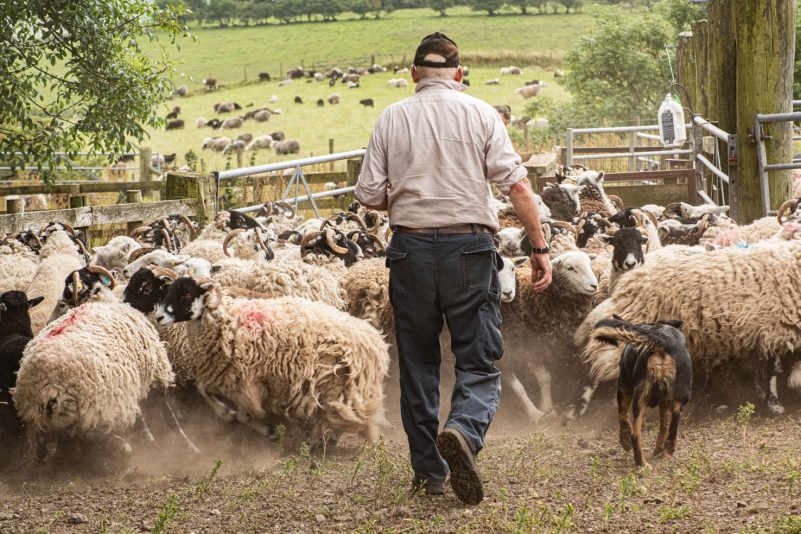One thing I Wished Everyone Knew: Farmers are not Resistant to Change!

This is part of our series of myth-busting blogs from consortium members, outlining one thing they wished everyone knew about the land use transition for net zero. The first in the series comes from LUNZ co-lead Lee-Ann Sutherland.
The question most often posed to me as an agricultural sociologist is ‘how can we convince farmers to do X’. Maybe it’s taking up a new technological innovation, or more commonly, an agri-environmental measure. Maybe it’s about use of antimicrobials, or willingness to work together, or response to climate change. The list has varied over the years but the basic question has remained the same, and underlying this question is an implicit or explicit assumption that farmers are resistant to change.
From the research I’ve undertaken in my 25 year academic career, I can state with confidence that most farmers are not resistant to change. Farmers make changes all the time – through the seasons, through the life course of the farm family, through technological advances, in response to policy and market shifts, and at present in response to climate change. In our analysis of the Farmer Intentions Survey – a representative survey of 2500 Scottish farmers that we undertake here at the James Hutton Institute every five years – we found that over two thirds of farmers had changed something substantial in their farm business in the preceding 5 years. They had actually made more changes than they anticipated they would make when surveyed five years earlier.
What farmers are, though, is path dependent. Contemporary farms are a substantial investment – land, labour and capital. The capability of their land limits what they can produce on it. Farmers have infrastructure and machinery – barns, combine harvesters, robotic milkers etc. – which are suited to producing particular commodities – and expensive to replace. They have established marketing channels, and in depth knowledge of how to produce the commodities they are producing. They are also culturally invested in their farms – their identity as ‘good farmers’ is dependent on their ability to farm well, to competently produce the commodities they do. For example, weedy fields are not just bad for the bottom line, they are bad for the reputation of the farmer. My Dad farmed most of his life, and right up to the end would look out a car window and point to the fields that weren’t well maintained. This path dependence isn’t limited to the UK, it’s characteristic of family farms everywhere.
It’s also important to remember that farmers risk a lot by making changes. Profit margins are small, so when they do decide to make a change, they don’t typically have many reserves to draw on, and they risk not only losing their livelihood, but their homes – and often the homes and heritage of generations of family farmers before them. It’s easy for scientists or agricultural advisors or policy makers to advise farmers to do particular things, but we don’t have any skin in the game. Our livelihoods and homes are secure. Because of the intergenerational nature of family farming, farm households have memories back to the 1950s and 1960s, when the government was paying them to rip out their hedgerows and apply chemicals and fertilisers to increase production. Farmers miss the days when they were the heroes of the food security story – and have learned to distrust scientists in the government, because of the changes we’ve made over the years. Commodity markets also fluctuate – it can take years to shift from dairy to beef production, or to convert to organic farming – only to have the markets fluctuate again by the time the new enterprise is established. Farmers have learned the hard way – and by apocryphal stories down the pub or the supper table – not to ‘chop and change’.
So what can we do to enable the major changes that need to happen in the agricultural sector? Three things. First is supporting peer to peer learning. Farmers learn best from other farmers, because those farmers have skin in the game too. Give them opportunities to see how it can work, and ask honest questions from someone who’s not trying to meet targets or sell them something. We should work with farmers to develop solutions, rather than develop them in a lab or computer model and expect farmers to blindly take them up. Farmers need confidence that making a change will improve their farm and their family’s lifestyle before they can – or should – take that risk.
Second is to work with triggers. Triggers are events that have the potential to change the trajectory of a farm, but usually occur only once or twice in a generation. Major disease outbreaks, long term shifts in profitability of particular commodities, and labour shortages all lead farmers to actively reconsider their current trajectory, to actively consider their options for doing something differently. Farm succession is a major trigger – there is good scientific evidence that farms will invest in innovations and diversification for a decade before a formal succession process actually occurs. The farm successor often wants to put their stamp in the farm business and try something new, and comes with a lot of enthusiasm and new ideas. Farmers without successors, nearing the end of their farming careers, downsizing and shifting into semi-retirement – those are the farmers I would characterise as resistant to change. Leave them to it, or help enable joint ventures through land matching services, to help newcomers into the sector. Enable smooth succession processes by supporting succession planning and offering grants or training that enable successors or new entrants to start something new.
The third action is to shift the narrative to appreciate farmers and the changes they have been making. Farmers are being portrayed as the problem, rather than the solution. No one responds well to the idea that their life’s work – and that of their parents and grandparents – is destroying the environment. Most farmers actually see themselves as environmental stewards, caring for the land so they can pass it on to the next generation. Like all of us, they want to be good at their jobs, and for others to see them that way. More importantly, the vast majority of them are good at their jobs. They are critical to our success in addressing the challenges ahead, and we need treat them as skilled professionals, capable of leading the charge into our net Zero future.

Professor Lee-Ann Sutherland
Principal Investigator
The LUNZ Blog
The LUNZ Blog provides a forum for Hub members, partners and other stakeholders to share their own research and perspectives and reach a variety of new audiences using accessible language. This could feature a new piece of research or a response to media stories on land use and net zero. The views expressed in this Blog are solely of the author do not necessarily reflect those of the LUNZ Hub.
Subscribe to our Newsletter
A quarterly update of all LUNZ Hub activities, events and news stories.
